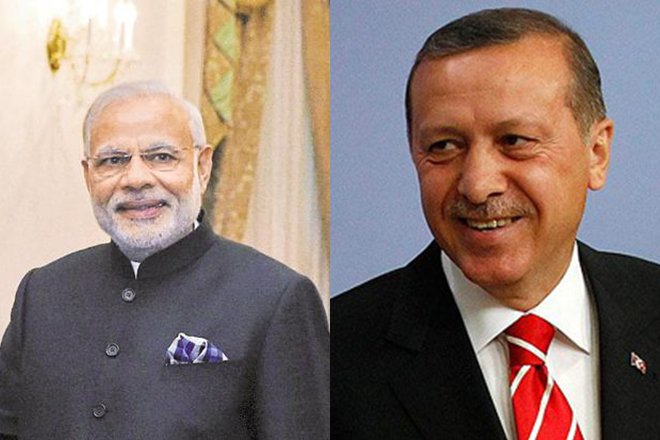Trade, terror to be focus of Modi-Erdogan talks

New Delhi, (IANS): Economic ties and cooperation in the fight against terrorism are expected to dominate the bilateral talks Prime Minister Narendra Modi and Turkish President Recep Tayyip Erdogan will have here on Monday.
Erdogan's Sunday-Monday India visit comes at the start of a diplomatic blitz he is embarking on after winning a referendum on April 16 which gave him more executive powers as President.
India-Turkey trade stands at $6.4 billion, which is much below potential, officials say. Ankara wants a Free Trade Agreement and a Comprehensive Economic Partnership Agreement to bridge the deficit with New Delhi.
With chances of Turkey becoming an European Union member diminishing, Ankara is actively looking to Asia in terms of economic development and security -- and India is seen as a major partner in this regard.
At a media briefing ahead of Erdogan's visit, Ruchi Ghanashyam, Secretary (West) in the External Affairs Ministry, said the Turkish leader would be accompanied by some cabinet ministers, senior officials and a 150-member business delegation that will take part in a meeting of the India-Turkey Business Forum.
She said there was scope for cooperation in areas such as construction, infrastructure development, renewable energy, tourism and film shooting.
At a meeting on "India and Turkey's Place in the Rising World" organised here, Kerem Alkin, Professor at the Istanbul Medipol University's Faculty of Business and Managerial Sciences, said Ankara wanted New Delhi to share its experience in power generation.
"There may be negotiations on energy supply during President Erdogan's visit," Alkin said. "We can work together on global energy demand, especially renewable energy."
Transportation, communication, logistics, tourism, retail and financial services are other areas flagged by Alkin where the two countries can cooperate.
Terrorism is expected to be another highlight of the Modi-Erdogan talks.
"Both India and Turkey have been battling terrorism for long and understand the need for acting against this global menace," Ghanashyam said.
Turkey has made it clear that it has no objection to India joining the Nuclear Suppliers Group (NSG).
Ilnur Cevik, Senior Advisor to President Erdogan, said Turkey would be interested in nuclear cooperation with India "and all other peaceful countries that seek peaceful use of nuclear technology".
Turkey's position on India's bid for permanent membership in the UN Security Council is different.
Cevik said his country wanted the five permanent members of the world body to give up their veto powers.
Turkey is a member of the group called Uniting for Consensus (UfC) that is opposed to expansion of permanent seats in the Security Council.
Other members of the group include Italy, South Korea, Canada, Mexico, Argentina, Pakistan, Malta, Costa Rica, Colombia and San Marino.
According to Ghanashyam, following the talks on Monday, some agreements that are currently being finalised are expected to be signed.
Erdogan last visited India in 2008 when he was the Prime Minister.
